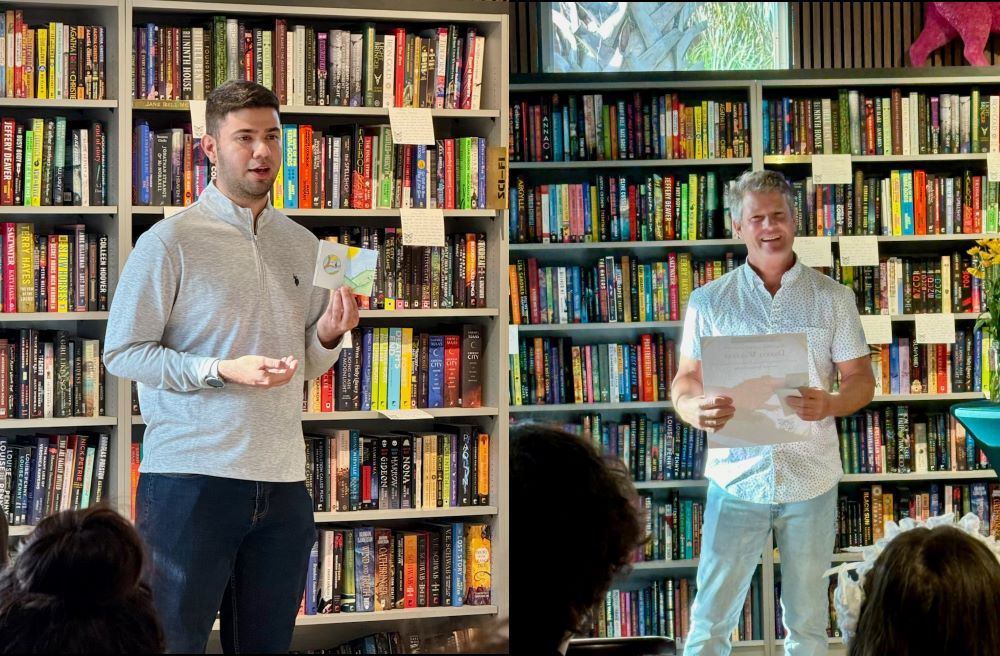UF workshop uses comics to build community and support transfer students
A three-day workshop at the University of Florida used comic books to do more than tell stories: it helped transfer students visualize a future at UF and introduced them to the academic study of comics as part of the humanities.
Comics and Community, funded by a $10,000 grant from the Modern Language Association with support from the Mellon Foundation, brought 13 students from Santa Fe College and the College of Central Florida to UF’s campus. The program offered an immersive introduction to how scholars study comics and showed how students can successfully transfer in to UF’s College of Liberal Arts and Sciences.
“Even in just two and a half days, the transformation was incredible,” said Associate Dean Adrienne Provost, Ph.D. “Students came in a little unsure. By day three, they were confidently presenting their own original comics to a public audience.”
Supporting Florida transfer students
A key goal of the Comics and Community workshop was to support Florida transfer students, especially those from state colleges, by giving them direct exposure to UF’s campus, faculty and advising resources. The first day of the workshop included sessions on transfer requirements, humanities majors and how to navigate the transition to UF.
“We want students to know they belong here,” Provost said. “Workshops like this demystify the process and help them feel connected before they even apply.”
The workshop also supports a broader effort to increase transfer student enrollment in humanities disciplines, which are often overlooked but deeply relevant, as they promote real-world skills like communication, creativity and critical thinking.
For Jack Angulo, a Santa Fe College student who attended the workshop, the experience offered both creative freedom and academic clarity.
“Before this, I thought comics were just a hobby,” Angulo said. “But this workshop showed me they can be scholarly too and can be used to tell powerful stories and explore serious topics.”
Angulo created a zine that honored the strength of his Nicaraguan family and reflected on how that solid foundation now empowers him to explore new opportunities.
“I was nervous to present at first, but once I saw everyone else, it made me want to share,” Angulo said. “This gave me the confidence to see myself as part of UF.”
Darryl Walters is a nontraditional student who is transferring to UF in the fall and planning to major in geographical sciences and sustainability. For Walters, the workshop helped ease some anxiety about stepping back into a large university environment.
“I’ve been to UF before, but something about this felt different,” Walters said. “Maybe it’s because I’m older now. The introduction to faculty and resources really softened the anxiety of transferring.”
One moment that stood out to Walters during the three-day workshop was the visit to UF’s Smathers Library. “The architecture blew me away, and I had no idea the map collection was so vast,” he said. “As a geography major, I was like a kid in a candy store. It opened my eyes to resources I never would have known about otherwise.”
Walters also found meaning in the creative side of the workshop, particularly the Sequential Arts Workshop, where students created their own zines.
“I started my zine after a class and it just clicked,” set Walters. “The act of putting my story on paper helped me reflect on my journey. And hearing others share made me realize we’re all carrying something similar; we just don’t always talk about it.”
Exploring Comics in the Humanities
The idea for the workshop emerged when Trysh Travis, Ph.D., an associate professor in the Department of Gender, Sexuality and Women’s Studies, approached Joanne Britland, Ph.D., an assistant professor in the Department of Spanish and Portuguese Studies about ways to showcase the value of a humanities education. The two then brought in Provost to access students as part of the Going Gator initiative. All three faculty members share an interest in making humanities education more engaging and accessible.
“We wanted students to see that comics are a real form of academic inquiry,” said Britland, who regularly teaches comics in her Spanish-language courses. “They’re not just entertainment, but can be powerful tools for expression, cultural analysis and connection.”
The workshop included faculty presentations, a visit to Gainesville’s Sequential Artists Workshop and hands-on time for students to create their own “zines,” or mini comics. Each zine told a personal story or explored a theme using visual storytelling. Students showcased their work during a final presentation at The Lynx bookstore in downtown Gainesville.
“Every student chose to speak about their comic,” Britland said. “They reflected on their experiences, their learning and what this meant to them. It exceeded all our expectations.”
From pilot project to institutional model
While the event was designed as a pilot program, organizers believe it could become a recurring part of UF’s summer offerings.
“This was our proof of concept,” said Travis. “We now have a model that works, not just for comics, but for any topic where we want to engage transfer students and showcase what the humanities can do.”
Travis and Britland envision future workshops focusing on topics like medical humanities or economic storytelling— areas where creative thinking and academic research intersect. They also hope to see the growth of interdisciplinary programs that bring together faculty from CLAS, and the colleges of the Arts and Journalism.
“This kind of cross-college collaboration is great, it’s what students are hungry for,” Travis said. “It’s time we matched their interests with flexible, creative academic pathways.”
Provost is currently seeking support to expand the project into a three-week summer humanities institute. Meanwhile, the success of the initial workshop continues to ripple outward.
“These students left with more than a comic book,” Provost said. “They left with a sense of possibility and a connection to the UF community.”

